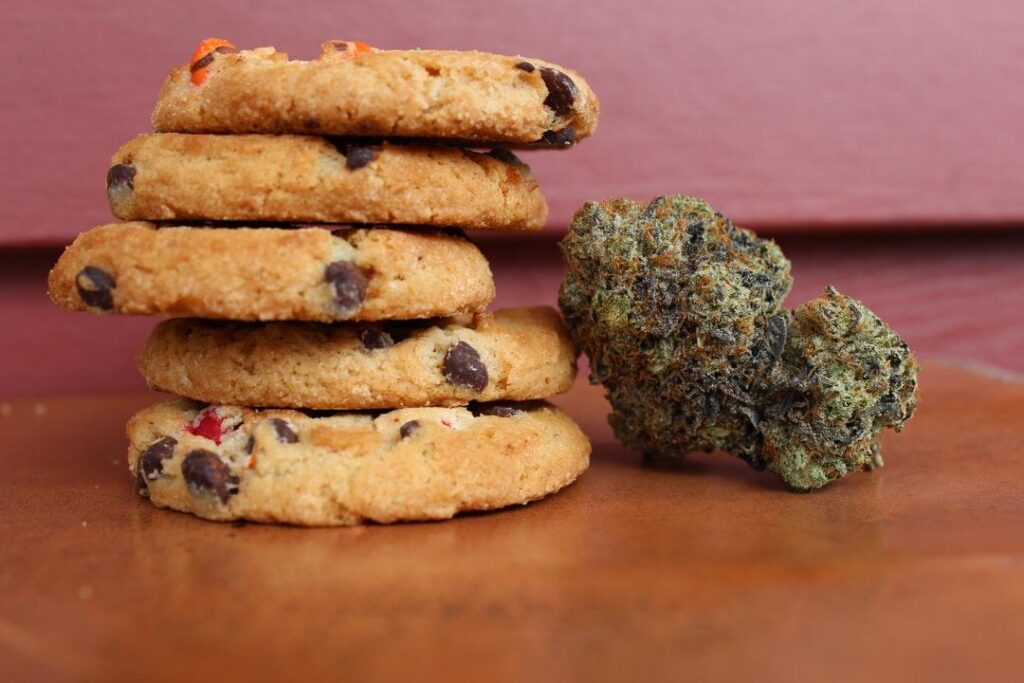Gut health has become a hot topic throughout the health community as recent research shows links between your gut and many other parts of your health. Since your digestion controls your ability to absorb nutrients from your food, it makes sense that anything improving or interfering with that absorption would also affect the bodily systems that those nutrients support. Many with gut-related disorders have found relief using THC products to improve gut health and digestion and reduce symptoms.
What Is Gut Health?
Though we often use “gut” as slang for a big stomach, “gut health” goes far beyond a beer belly. Your gut refers to many parts of your digestive system, including your stomach, colon, and intestinal tracts. These organs contain a complex microbiome that works together to help you digest your food comfortably and effectively.
Gut health describes the state of this microbiome and how well you digest your food as a result. Though gut health may mean something a little different depending on the context, it generally refers to the balance of your microbiome and your ability to digest food with limited negative symptoms.
What Affects Gut Health?
The microbiome in your gut can be affected by many things. While your diet is a primary influence, these microorganisms can also be affected by things such as illness, immune responses, poor sleep, physical activity, or even medications you take.
You can also positively influence your gut bacteria by adding things such as probiotics to your routine, either with foods such as yogurt or in the form of a pill or vitamin.
What Is THC and How Does It Affect Our Bodies?
Tetrahydrocannabinol, or THC, is the primary compound in cannabis that makes us “high.” It works by entering the bloodstream, traveling to the brain, and binding with natural cannabinoid receptors in your neurons to trigger the feelings associated with your high such as relaxation or giddiness. Other cannabinoid compounds such as CBD may also bond with these receptors, affecting the type of high — such as a “body” high vs. a “head” high — that you might feel.
THC and Gut Health
Though many of the cannabinoid receptors THC bonds with, known as CB1 receptors, are found in your brain and nervous system, a second type of cannabinoid receptor known as CB2 can be found throughout your body, including within your gut. Research into cannabis for medical use was somewhat sparse until recently, largely due to federal restrictions on its use and distribution, but studies conducted so far have shown some promise in treating a variety of ailments using cannabis. This includes gut-related disorders such as IBS, Crohn’s, ulcerative colitis, and other inflammatory bowel diseases.
Though the effects of THC and CBD on the actual gut microbiota are somewhat under-studied, many patients still use cannabis to treat the symptoms of bowel diseases such as pain, inflammation, and nausea. Medical cannabis has been used for some time for pain relief and treatment of nausea or vomiting, not just for digestion or gut conditions but for a variety of diseases with such symptoms.
One 2020 study did show that CBD use in mice worked as a probiotic up to a certain limit, at which point it became harmful instead. Although this was not a human study, researchers believe the effect would be similar. For this reason, it’s a good idea to work with a health professional to determine the ideal dose of any cannabis product for the best health benefits without crossing that line.

Tips for Using THC To Improve Gut Health
Not all cannabis products are created equal, so here are some tips to find the best ones for treating your gut.
Strains
When choosing a strain of marijuana for your treatment, lean toward something high in both CBD and THC. Though THC primarily bonds with CB1 receptors, the CB2 receptors found in your gut work best with a combination of CBD and THC.
When purchasing flower, typically Indica or Indica-leaning hybrids will have more CBD than Sativas, but this is not always the case. When in doubt, read any labeling available, or ask a budtender for a recommendation. In the case of edibles, oils, or tinctures, the amount of THC and CBD in each dose should be printed clearly on the packaging.
Forms
Weed can be used in a few different forms, including flower, vapes, edibles, oils, tinctures, or topicals. Each will have pros and cons when it comes to treating gut symptoms.
Inhalants such as smoked flower or vapes reach your bloodstream very quickly since they have easy access through your lungs. However, for some people, they can cause irritation in your lungs and throat, leading to discomfort, coughing, and inflammation.
Edibles, oils, and tinctures don’t have that problem, but they do take much longer to kick in — upwards of two hours, in some cases — since they have to be processed by your digestive system before they reach your bloodstream. They do, however, tend to last much longer than inhalants, since they’re dispensed by your liver over a longer period of time. Oils and tinctures have the added benefit of being able to take them via an eyedropper, or mixed into food to disguise the taste or spread out the dose.
Topicals don’t require ingesting the product at all, but are instead massaged into the skin. Though this helps you avoid negative effects such as lung irritation or unpleasant flavors, it’s also typically the least effective way of using cannabis since it has to be absorbed through the skin over time and may be easily wiped off if you’re not careful.
When using THC for digestion treatment, generally, inhalants are better for quick relief, since they usually reach full effect within 15 minutes. Edibles are ideal for routine treatment, since they take longer to kick in, but usually last longer, so doses can be scheduled according to when you most need relief. Topicals are generally best for treating ailments near the surface, such as joint pain, so they may not be the best option for gut health. However, you should experiment and figure out what works best for you.
Medical Note
If you’re currently being treated for any medical condition, talk to a doctor before changing or adding to your current treatment regimen. Cannabis may interact with certain medications, so it’s important to discuss your THC gut health treatment to determine if other treatments will need to be adjusted first.
Treat Your Gut With VidaCann
If you’d like to try treating your gut with THC, check out VidaCann’s medical cannabis offerings. Our experienced budtenders can help you find just the right products and strains to help you feel better.








